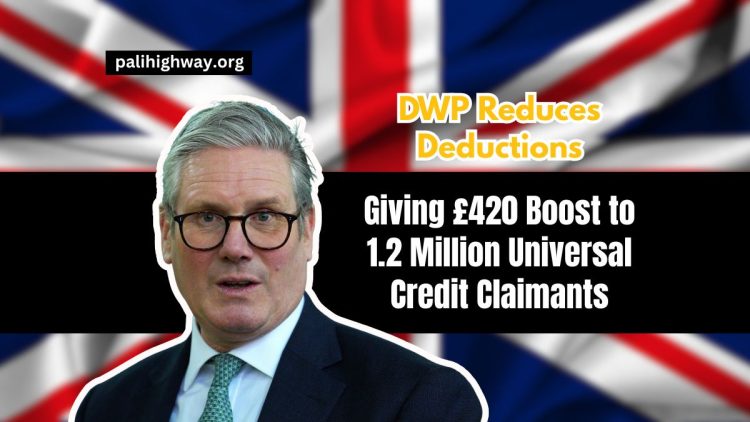On 30 April 2025, a key update to Universal Credit was enacted by the UK Government. This reform introduces the Fair Repayment Rate, reducing the benefit deductions from 25% to 15%.
As a result, 1.2 million low-income households, including 700,000 households with children, will now be able to keep more of their Universal Credit payments.
Financial Impact on Households in Debt
This change is expected to provide affected households with an average annual gain of £420. The households that will benefit are those that have been experiencing deductions from their Universal Credit due to outstanding debts.
The new cap limits the amount that can be deducted from the standard allowance during each assessment period. This rule applies to all periods starting on or after 30 April 2025.
| Affected Group | Average Annual Gain |
|---|---|
| Low-income households | £420 |
| Households with children | £420 |
The Government’s Economic Plan
This adjustment is part of the UK Government’s Plan for Change, which aims to improve the financial situation of working people and support those in need. The broader objective is to increase living standards and help individuals secure jobs.
Through this plan, the government is committed to ensuring that working individuals retain a greater portion of the support they are eligible for, while also extending financial support to low-income families.
Official Statements on the Change
Chancellor Rachel Reeves confirmed the update in a statement, highlighting that this reform is in line with the goals set in the budget.
She emphasized that from now on, 1.2 million households will benefit, with the average annual gain being £420. This will help alleviate the cost of living for many families.
Chancellor’s Quote
“This is our plan for change delivering, easing the cost of living, and putting more money into the pockets of working people.”
Work and Pensions Secretary Liz Kendall also expressed her commitment to improving financial security and ensuring that working families retain more of their entitled benefits. She reaffirmed the government’s dedication to creating better living standards.
Secretary Kendall’s Quote
“We’re delivering meaningful change to ensure everyone has a fair chance, the support they need, and real hope for the future.”
Ongoing Support for Debt Repayment
Despite this reduction in deductions, households will continue to receive support for debt repayment. An estimated 2.8 million households are still facing deductions to repay their debts under Universal Credit.
The Government’s revised cap allows for sustainable debt recovery, ensuring that those affected can manage their living expenses while also addressing their financial obligations.
Focus on Employment and Wage Growth
This Universal Credit change is a part of a wider reform aimed at increasing employment and reducing poverty. The Government’s Get Britain Working White Paper outlines plans to reach an 80% employment rate.
Proposed reforms include revamping Jobcentres, launching a new jobs and careers service, and implementing a youth guarantee that ensures every young person will either be working or learning.
These employment-related reforms are aligned with the recent increases in the National Minimum Wage and National Living Wage. These measures aim to make employment more attractive and financially feasible, ultimately helping to reduce poverty by increasing incomes for working households.
Extended Household Support Fund
To further support vulnerable families, the Government has also extended the Household Support Fund, allocating an additional £742 million to local councils. This funding helps families cover essential living costs like food, energy bills, and other basic necessities.
The funds also contribute to long-term initiatives such as home insulation, which will help lower future living expenses for at-risk households.
Tackling Child Poverty
The UK Government is actively addressing child poverty through the creation of a ministerial task force.
One key initiative underway is the rollout of free breakfast clubs in all primary schools in England, designed to support children from low-income families. These efforts reflect the government’s commitment to giving every child a strong foundation for their future.
Ongoing Review of Universal Credit
The introduction of the Fair Repayment Rate is just the beginning of a broader evaluation of the Universal Credit system.
The Government is reviewing how the system supports individuals in work, families with children, and those facing financial hardship. These changes aim to ensure that Universal Credit remains effective and continues to meet the needs of the population.
First Step in Broader Reform
The Fair Repayment Rate marks a crucial first step in the Government’s series of welfare reforms. This adjustment is a clear indication of the Government’s intention to increase household stability, raise income levels, and generate employment opportunities.
With over 1 million households now benefiting from the new repayment rate, the government has set the tone for future reforms aimed at improving the welfare of families across the UK.
The introduction of the Fair Repayment Rate is a crucial step towards providing financial relief to low-income households in the UK. By reducing the deduction rate from 25% to 15%, the government is helping families retain more of their Universal Credit and improving their overall financial security.
This reform, along with the government’s broader Plan for Change, aims to tackle child poverty, enhance employment opportunities, and reduce the cost of living for many families across the country.
FAQs
How much will households benefit from the new Universal Credit repayment rate?
Households will see an average annual increase of £420 due to the reduction in deductions, which will allow them to retain more of their Universal Credit.
Who will benefit from the Universal Credit change?
The policy change will affect 1.2 million low-income households, including 700,000 households with children.
What are the broader goals of the UK Government’s Plan for Change?
The Plan for Change focuses on improving living standards, providing financial support for low-income families, and creating employment opportunities for working people.

